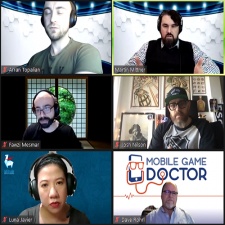As the Coronavirus pandemic closes in on its one-year anniversary, our approach (and tolerance) for working remotely has adjusted significantly. Things that felt alien to us this time last year are now normal, and while there's a light at the end of the tunnel with news of vaccinations, remote working is still our reality for now.
As part of Pocket Gamer Connects Digital #5, Mediatonic's Arran Topalian hosted a panel session all about how to create a game remotely. The panel also featured Martin Mittner from Tiny Hydra, Josh Nilson from East Side Games, Luna Javier from Altitude Games, Dave Rohrl from Mobile Game Doctor, and Fawzi Mesmar from EA DICE.
Topalian kicked off the session by asking the panelists how their companies and projects have pivoted to cope during the pandemic.
"Altitude was already designed to be remote, but we had a co-working office prior to the pandemic," Javier said.
"Things like interviewing applicants, staff performance reviews, etc, were things we'd prefer to do in person. Work is mostly easy, but we miss the personal connections."
Dave Rohrl followed up by highlighting that it is particularly difficult to have eyes on everything happening across a company when all operations are happening remotely.
"It's a terrible time to be a micro-manager," Rohrl said.
"Those who need to know every detail of how things are getting done and have fingers in lots of pies. Forget it, you don't have enough fingers. Remote forces a work style that makes you highlight what your priorities are."
Hiring new people has also presented a few challenges, as onboarding new employees remotely present new logistical and cultural problems. Fawzi Mesmar commented on how new DICE employees only get a sense of how big the company actually is in wider meetings, because they're mostly confined to their smaller teams.
"We've had a bunch of people coming into the company, and they come into a small team of eight or nine people, and then get a real scale of the company through wider meetings," Mesmar said.
"The logistical challenges of getting equipment to new employees is something we're used to now, but it was interesting to figure out this time last year."
Capturing company culture
It can be difficult to get a sense of how a company feels while working remotely. Running into staff members around the office, loitering in hallways for quick chats and routine after-work pints are just some of the things that employees can no longer indulge in.
In this new remote landscape, culture is highlighted and maintained across company Slack/Discord channels, and Zoom meetings. However, culture goes beyond who and where you connect with, it's also about setting rules for what is appropriate in these online social settings. Where are the lines for jokes? How can we make these spaces inclusive for everyone at the company?
"To set company culture, we need to set out what people are interested in, what is funny, and what is and isn't appropriate for the office," Javier stated.
Josh Nilson added: "If you have at least 30 people on the team, you should have someone specialising in managing the company culture,"
"The small gestures go a long way in welcoming someone to a team."
Rorhl also highlights the importance of visible leaders in digital teams, saying that managers and C-level employees should have a physical presence in company Slack/Discord channels.
The work/life balance
The panel also addressed the precarious balancing act of work life and personal life, when everything happens in one single space. Mesmar said that companies need to actively ensure that employees are taking time out for themselves.
"We encourage people to take care of themselves remotely," he said.
"We made sure that there are reminders to reset, we have guided meditation for people to participate in. We even have an app to encourage people to stay active and log their exercise.
"Log out, go take care of yourself every now and then."
Martin Mittner also notes that some people that live alone are quite likely to overwork as a result of nothing else to do during lockdowns.
"If you live alone there's a temptation to throw yourself completely into work," he said.
"We have to be really cognizant of that, if you need a mental health day, you need a mental health day."
The last point of the panel covered communicating ideas effectively online. Rorhl addressed the point, highlighting the ease of this in a world with so much technology to do so.
"Thank god we're living in the future where we can jump in a video call and draw on the screen," he added.
PGC Digital #5 will run from February 8th to February 12th. To keep up to date with all of our coverage, check out the roundups here. There's still time to sign up - to find out more and book a ticket, head to the website.





















